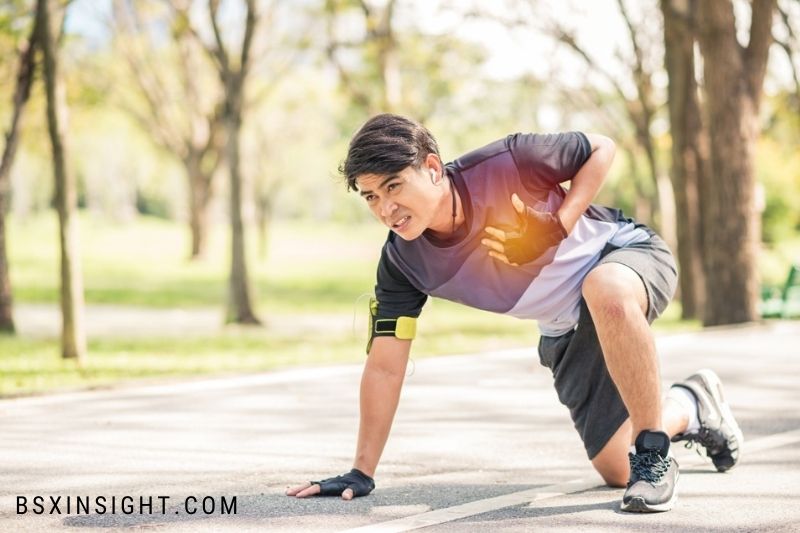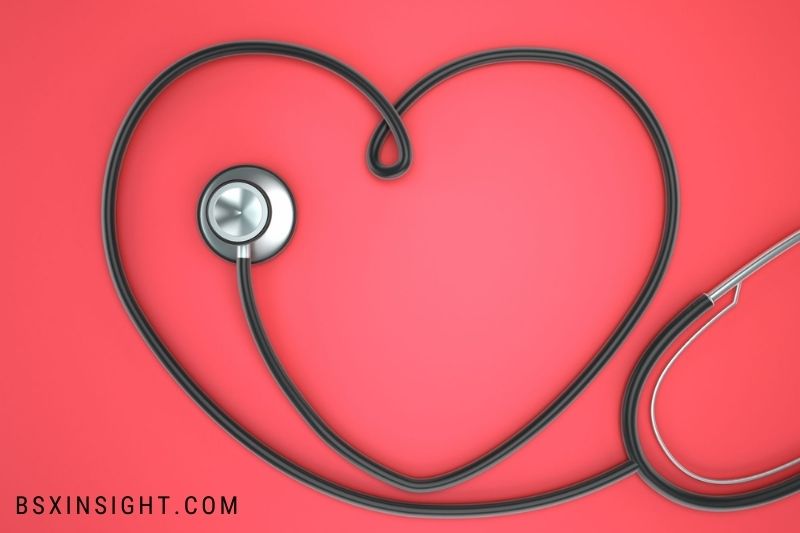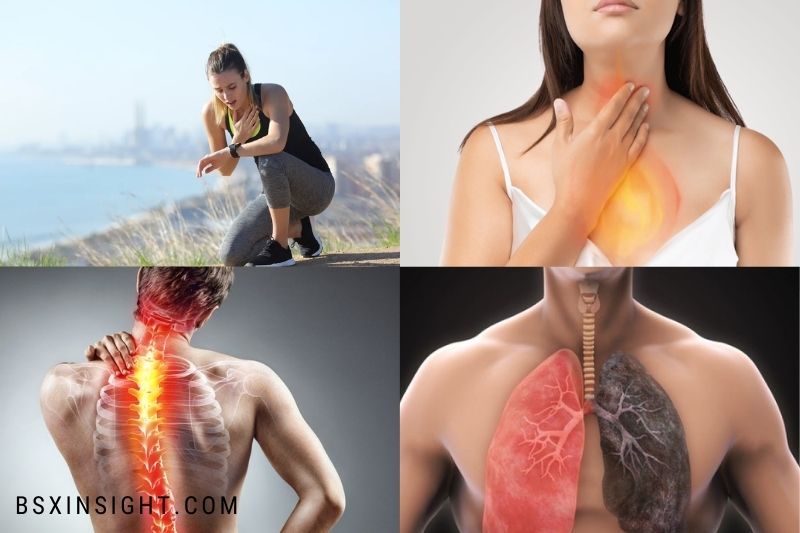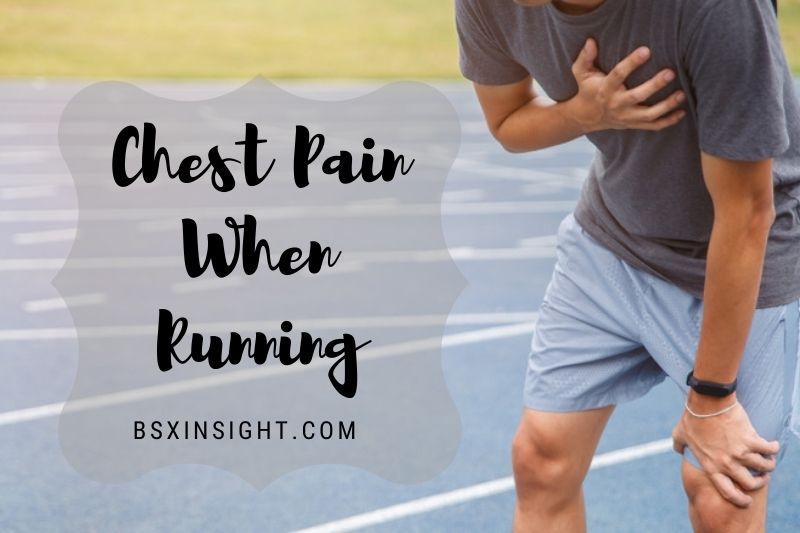- BSX Insight
Chest pain when running can be a sign of several different medical conditions, some of which can be serious. It is important to seek medical attention if you are experiencing chest pain while running, in order to determine the cause and receive treatment if necessary. Read our post to get more information.
Your Heart On A Run
You may think that sharp chest pains result from a heart attack, regardless of whether you are just starting to run or have been running for years. This is not always true.
A patient who complains of sharp, sudden pain in the chest is most likely to have angina, myocardial, heart disease, or heart attack. According to Tamara B. Horwich MD, an associate clinical professor of medicine/cardiology at UCLA, angina, ischemia, and heart attacks often feel like chest pressure or tightness.
However, you should not worry about your chest pain when running. Before you go for a run, here’s what cardiologists have to say about chest pain.
Running And Heart Attacks

According to the American Heart Association‘s 2018 research published in Circulation, a sudden heart attack is not common among runners. A sudden cardiac arrest is an electrical malfunction that causes the heart to stop beating. It affects about 0.54 of 100,000 runners participating in marathons and half-marathons.
Although this is a small percentage, 71% of those who died in cardiac arrest were running marathons rather than half-marathons. Heart attacks can lead to cardiac arrest. However, not all heart attacks are responsible for cardiac arrest.
However, you shouldn’t ignore your chest pain while running. “Not all chest pain can be considered cardiac chest pain. However, runners should listen to their bodies and get checked out if they feel any discomfort,” Eugene Chung MD, a sports cardiologist at the Michigan Medicine Frankel Cardiovascular Center and chair of the American College of Cardiology’s section on exercise and sports cardiology.
Pay attention to the warning heart attack symptoms
- A feeling of pain in your chest center that lasts more than a few seconds or comes and goes.
- Feelings of tightness or heaviness in the chest
- Pain in the jaw, back, chest, and other parts of the upper body.
- Breathing difficulties
- Nausea, lightheadedness, and fatigue
- Cold sweats
Some women might not feel any chest pain. They are more likely to experience shortness of breath, nausea/vomiting, jaw and back pain, and other symptoms such as heart attacks.
Everyone, Even people in great shape, can feel pain in the chest after exercising. There are many possible causes, from benign to life-threatening.
When to Be Concerned About Chest Pain When Running
If you’ve ever experienced chest pain while running, it would be wise to familiarize yourself with the symptoms of a heart attack so you’ll know when to seek medical attention.
Thus, you should immediately contact 911 if you experience any of the following signs and symptoms in addition to chest pain while running or afterward:
- Chest pressure, chest pain, or a disquieting feeling of fullness can all be indicators of a heart problem.
arrhythmia, a.k.a. irregular heartbeat or rate - Experiencing difficulty breathing
- Dizziness
- Perspiring too much
- Nausea
Furthermore, if you have other risk factors for heart disease or cardiovascular disease, you should discuss any chest pain you experience during or after exercise with your healthcare provider.
Possible Causes Of Heart-related Chest Pain When Running

Angina
Dr. Chung says that chest pain caused by exertion can be an indication of angina. A supply-demand mismatch in the heart causes this due to a blockage. If your coronary arteries—which bring blood to your ticker—contract, the insufficient blood supply can induce chest pain when you exercise.
Dr. Chung explains that angina can be characterized by an increase in chest pain, shortness of breath with exercise, radiating pain to the jaw, back, or left arm, nausea, and vomiting.
Dr. Chung says, “If these symptoms don’t resolve quickly with resting, I will seek medical treatment immediately.” It is essential not to take it lightly if you feel faint while exercising. It may not be necessary to call the doctor immediately if it is an isolated incident.
Dr. Chung warns that if you have persistent symptoms such as fainting episodes or other signs, it is important to seek medical attention.
Also read: Lower Back Pain When Running: Causes And Treatments 2023
Supraventricular Tachycardia
Talk about anything that slows down your stride. While running, you can say “supraventricular tachycardia” or SVT for short. Dr. Chung says that SVT is a new arrhythmia, which means you’ve never experienced it before. It can cause chest discomfort, shortness of breath, and/or palpitations.
Sometimes, SVT can be without symptoms. The heart normally beats 60-80 times per minute. It is more than 100 beats per hour in SVT. Although SVT is not usually a cause for concern, it should be reported to your doctor if you feel your heartbeat racing.
Your doctor may show you the Valsalva maneuver to slow down your heartbeat if you have frequent episodes of SVT. This is a technique where you “bear down” and try to exhale using your stomach muscles, but not your nose or mouth. If this fails, your doctor may recommend medication to slow down your heart rate.
Hypertrophic Cardiomyopathy
Hypertrophic cardiomyopathy (HCM), a condition where the heart muscle thickens, makes it more difficult for the heart to pump blood. The thickening usually occurs in the left ventricle, which is responsible for pumping oxygen-rich blood into the body. This causes problems because the heart cannot pump enough blood or block blood flow.
Some people may not experience any symptoms. Some people may feel chest pain, which can be accompanied by exertion, heart palpitations, and shortness of breath. HCM is rare. You should still visit your doctor regularly to discuss your risk factors and discuss preventative treatments like beta-blockers or channel blockers to relax your heart muscle.
Common Causes Of Chest Pain Not Connected To Heart Disease

Asthma That Is Exercise-inducible
Even people without asthma can get exercise-induced asthma. Exercise-induced asthma can be diagnosed if you experience wheezing, coughing, shortness of breath, tightness in your chest, or discomfort soon after you have started running. The American Academy of Allergy and Asthma and Immunology states that people suffering from this condition are sensitive to low temperatures as well as dry air.
Running in cold or dry conditions doesn’t mean you have to stop. After a run, warm up slowly and then cool down. To breathe in moister and warmer air, you can wear a scarf or mask over your mouth. If you continue to have problems, consult your doctor. It is possible to take prescription medication or an inhaler before exercising.
Heartburn
Dr. Chung said that heartburn patients often describe their chest pain as a central, sharp pain. It’s not surprising that intense chest pain would make people stop in their tracks. Heartburn can also cause a bitter taste in your mouth and may make you feel the same pain when you lie down. Running can create abdominal pressure. This can lead to stomach acid traveling up to the esophagus and causing chest pain.
Avoid heartburn by not running after eating. Heartburn is less likely to be caused by a small snack before you run. If you experience heartburn while running, avoid acidic and spicy foods, carbonated beverages, and coffee.
Does your hip feel hurt after running? Check out our post for more detailed info: Why Does My Hip Hurt After Running? Causes And Treatments
Pleurisy
Running outside in the cold or when the air quality is bad can cause pleurisy, which is an inflammation of the tissues that line the lungs and chest.
If someone with asthma or who just got over a cold goes for a run outside, they are more likely to get pleurisy. Running can cause symptoms like chest pain, a persistent cough, and trouble breathing.
Tense Muscles
Breathing muscles are commonly overlooked, yet the intercostal muscles in the chest are easily strained.
Because the intercostal muscles are stretched as the chest expands, strains or injuries to these muscles can result in chest pain while breathing.
Lung Problems
The most common reason for chest pain that strikes after or during exercise is a spasm in the lungs’ small airways. Exercise-induced bronchospasm, also known as EIB, can cause severe chest pains and make breathing difficult. It can be more severe during certain seasons or in certain environments.
For accurate testing to determine whether EIB is the cause of your chest pain, you may need to see a pulmonologist. The good news is that many people who seek treatment are able to improve their athletic performance.
Pneumothorax is a rare but serious condition that can affect the lungs. This happens when air gets into your lungs from your chest wall. Pulmonary embolism is when blood clots in the lungs. It can happen after orthopedic surgery, prolonged rest, or after injury.
Outdoor athletes can be more susceptible to viral and bacterial lung infections. This can lead to pneumonia, pleurisy, and inflammation of the tissues in the lungs. If you don’t quickly respond to your inhaler, this could signify worsening breathing mechanics, causing severe pain and the need for urgent care.
Musculoskeletal Pain
Dr. Horwich states that sharp chest pain that disappears quickly and comes on suddenly is more likely to be due to muscular, joint, or skeletal pain, such as costochondritis. Costochondritis is a condition that causes pain in muscles surrounding your rib cage (called “intercostal muscles”). It can cause severe chest pain.
A deep breath can also be affected by the inflammation of the breastbone. The pain can radiate to your arms and shoulders, which closely mimics a heart attack. Costochondritis doesn’t affect the heart, but you should seek medical attention if you have chest pain. Your doctor will be able to recommend the best pain relief or over-the-counter anti-inflammatory drugs that can be used to relieve the pain. Here are proven ways to combat inflammation.
Read also: Cramping When Running: What Are Causes And How To Treat?
Cramping and dehydration
Particularly if you are dehydrated or have an electrolyte imbalance, you may experience cramping in the intercostal muscles that are located between the ribs.
Covid-19
Although chest pain is a common symptom of Covid-19, it is usually only experienced during strenuous activity. However, some patients have reported experiencing chest pain even when they are just running or walking at a moderate pace. This suggests that the virus may be affecting the heart and lungs more seriously than previously thought. If you experience any chest pain, it is important to see a doctor as soon as possible.
Dr. Chung says, “In the context of recovered infection from Covid-19, we also need to be concerned about any lingering effects on the coronavirus within the lung and heart.” I would wait 10 days to diagnose or resolve symptoms and then slowly ramp up activity for the next seven days.
If you are a novice runner, make sure to visit your doctor and tell them about your training plans.
What To Do When Chest Pain Strikes
Dr. Singh advises that you don’t push through the pain if it feels like something is bothering you. Notify your trainer immediately and tell them what’s happening.
You should immediately visit the emergency room if you feel severe pain.
You should see a doctor if you feel the pain is subsiding. The doctor will talk with you about your symptoms and assess your heart, lung, and digestive health. Your doctor may refer you for further evaluation if the source of your pain is not yet clear.
Only 5% of young athletes experience chest pains due to heart problems, but they are serious and should not be ignored. Chest pains, whether athletes or not, are a concern and should be treated immediately.
When Should You See A Doctor?
See a doctor about any new, unidentified, or worsening chest pain. A doctor will be able to diagnose the cause and suggest a treatment plan that may include lifestyle modifications.
For any symptoms of a heart attack, seek emergency medical attention immediately. The most common symptom is chest pain. Other symptoms, such as nausea, are more common in women than in men.
Exercise-induced asthma sufferers should seek out specific treatment. Your doctor might be able to prescribe medication or suggest other methods relieve symptoms. This could allow a person to continue participating in exercise or sports.
FAQs
How to reduce chest pain while running?
If you experience chest pain while running, you can do a few things to reduce the pain. First, make sure that you are warm enough by wearing proper clothing and gradually warming up before you start running. Second, try to run at a steady pace instead of starting and stopping abruptly. Finally, focus on your breathing and ensure you take deep, even breaths. If the pain persists, slow down or stop running and consult a doctor.
Is it normal for your chest to hurt while running?
Why Chest Pains During Exercise Occur. People develop chest pains during exercise because the heart receives signals from the brain to do more work. This means the heart beats harder to pump more blood to fuel the body. If the heart has any sort of blockages, the blood vessels cannot properly dilate.
What age do heart attacks occur?
Is there an average age range for heart attacks? According to a 2018 report, the average age for a first heart attack is 65.6 years old for men and 72 years old for women.
Can it be chest pain when running but not cycling?
There are many potential causes of chest pain when running but not cycling. It is important to see a doctor to rule out any serious underlying causes. Potential causes include heartburn, GERD, costochondritis, and stress. Heartburn and GERD can both be aggravated by exercise. Costochondritis is inflammation of the cartilage that connects the ribs to the breastbone and is often aggravated by activities that involve repetitive motion or impact. Stress may also cause chest pain due to tight muscles and shallow breathing.

